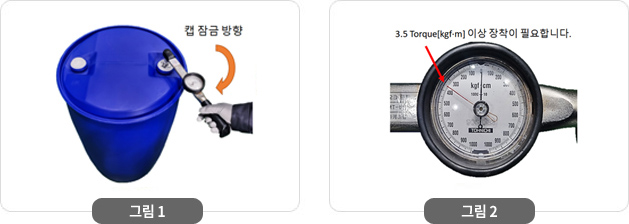IBC Instruction Manual
We put quality first, providing only the best products.
Drum Instruction Manual
-

How to Install a Drum Cap
- Align the threads of the CAP and the inlet opening and lock them tightly
by hand (if you turn them slightly counterclockwise and then clockwise,
they will be easily installed). - Use a torque wrench to further lock it as shown in Figure 2 (minimum
torque: 3.5kgf•m).
※ However, the minimum torque is based on testing with water. Please
note that the minimum torque may vary depending on the chemical
used. - Excessive tightening may cause the O-Ring to wear out, cause the CAP
to spin, and make it impossible to install the seal cap. - If you lock the CAP only by hand, the substance inside may leak. So,
please make sure to use a torque wrench to lock the CAP.

- Align the threads of the CAP and the inlet opening and lock them tightly
-

How to Install a Drum Seal Cap
- After locking the CAPcompletely, fasten the seal cap by tapping
the left and right sides of the seal cap handle with a rubber mallet
(however, do not use a rubber mallet on the handle for removing
the seal cap). - There is a risk that it may not be installed easily or may be damaged
if a momentary impact is applied to the part.

- After locking the CAPcompletely, fasten the seal cap by tapping
-

Precautions
- A product filled with a substance should always be stored and handled upright (especially vent cap products).
- If the bung is not installed correctly, the seal cap may be damaged causing leakage ofthe substance inside.
- When loading on the pallet, the container must be placed suchthat it does not fall off the pallet (there is a risk of the container being crushed).
- During storage, avoid exposure to direct sunlight (ultraviolet rays) and store at room temperature in a well-ventilated area (ultraviolet rays cause
deterioration ofthe physical properties of the container).


